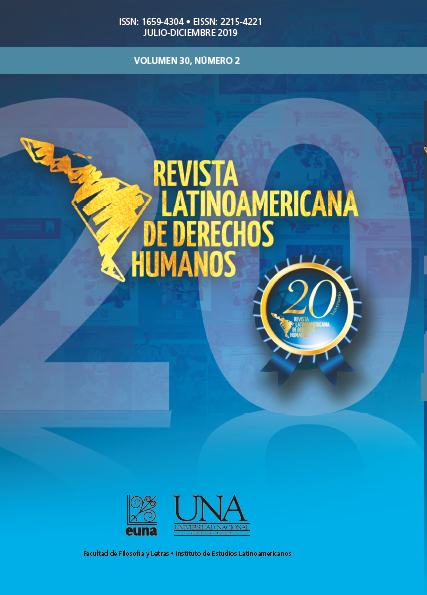Childhood, human rights and citizenship
DOI:
https://doi.org/10.15359/rldh.30-2.3Keywords:
Children's rights; Citizenship; Paradigms; Progressive autonomy.Abstract
Although the legal scenario for children after the advent of the International Convention on the Rights of the Child has generated an impact on national laws, the exercise of these rights by their holders continues to present some restrictions. In this sense, the present article aims to perform an analysis on the paradigm shift in childhood as associated to the notion of citizenship, which is understood as a process of affirmation and conquest of rights. Thence, the analysis initiates from an old conception of protection that considered the minor as an incapable and incomplete being, in contrast to a new protection paradigm, resulting from new laws for children and their condition as holders of rights. In this context, childhood citizenship is understood as opposed to the idea of “future citizens”, based on the rights that were acquired, including the right to participate and be social actors, in accordance with the development of progressive autonomy. Therefore, it is considered necessary to affirm the citizenship of children through the principle of progressive autonomy in order to achieve equal rights among people and build more democratic societies.
References
Ariès, P. (1987). El niño y la vida familiar en el Antiguo Régimen. Madrid, España: Taurus editorial.
Baratta, A. (1998: 21-40). Infancia y democracia. En García, E. y Beloff, M. (Org.), Infancia, ley y democracia en América Latina. Análisis crítico del panorama legislativo en el marco de la Convención Internacional sobre los Derechos del Niño (1990-1998) (pp. 21-40). Temis/Depalma: Colombia.
Beloff, M. (2009). Los derechos del niño en el Sistema Interamericano. Buenos Aires, Argentina: Editores del Puerto.
Cillero, M. (1997) Infancia, autonomía y derechos: Una cuestión de principios. Infancia: Boletín del Instituto Interamericano del Niño - OEA, 234, 1-13.
Casas, F. (1998). Infancia: Perspectivas psicosociales. Barcelona, España: Ediciones Paidós.
Casas, F. (2006). Infancia y representaciones sociales. Política y sociedad, 43(1), 27-42.
Demo, P. (1996). Participação é conquista. São Paulo, Brazil: Cortez editora.
De Mause, L. (1982). Historia de la infancia. Madrid, España: Alianza Universidad.
Dworkin, R. (1984). Taking Rights Seriously (Marta Guastavino, trad.). Barcelona, España: Editorial Ariel.
García, E. y Carranza, E. (1990). Infancia, adolescencia y control social en América Latina. Buenos Aires, Argentina: Editorial Depalma.
García, E. y Carranza, E. (1992). Del revés al derecho. La condición jurídica de la infancia en América Latina. Buenos Aires, Argentina: Editorial Galerna.
García, E. (1994). Derecho de la infancia-adolescencia en América Latina: De la situación irregular a la protección integral. Santa Fe de Bogotá, Colombia: Forum Pacis.
García, E. (1997a). Derecho de la infancia adolescencia en América Latina. De la situación irregular a la protección integral. Ibagué, Colombia: Forum Pacis.
García, E. (1997b). Cidadania da Criança: A Revolução Francesa com 200 anos de atraso. Revista Inscrita, 1, 27-32.
García, E. (2015). Infância, lei e democracia: uma questão de justiça. Revista Brasileira Adolescência e Conflitualidade, 8, 1-22.
Habermas, J. (1989). Identidades nacionales y postnacionales. Madrid, España: Editorial Tecnos.
Habermas, J. (1998) Facticidad y validez. Sobre el derecho y el Estado democrático de derecho en términos de teoría del discurso. Madrid, España: Trotta editorial
Habermas, J. (1999). La inclusión del otro. Estudios sobre teoría política. Barcelona, España: Editorial Paidós
Jaramillo, L. (2008). Concepción de infancia. Zona Próxima, (8), 108-123.
Kuhn, T. S. (1971). La estructura de las revoluciones científicas (Agustín Contín, trad.). México: Fondo de Cultura Económica. (Obra original publicada en 1962).
Marshall, T. (1967). Cidadania, classe social e estatus. Rio de Janeiro, Brazil: Editora Zahar.
Naciones Unidas (2006). Convención Internacional sobre los Derechos del Niño: 20 de noviembre de 1989. Madrid, España: UNICEF-Comité Español.
Piedrahita, M. (2004). El “descubrimiento” de la infancia (I): Historia de un sentimiento. Revista Electrónica de Educación y Psicología, 1(1), 1-11.
Rawls, J. (1995). Liberalismo político (Sergio Madero, trad.). México: Fondo de Cultura Económica.
Rousseau, J. (1982). Emilio. Madrid, España: Editorial Edaf.
Downloads
Published
How to Cite
Issue
Section
License
El material que se publica en esta Revista está bajo una licencia “Creative Commons” 3.0 Costa Rica (CC, Reconocimiento-NoComercial-SinObraDerivada 3.0 Costa Rica (CC BY-NC-ND 3.0 CR) . Esto significa que el material publicado en la revista se puede compartir (copiar y distribuir) en cualquier medio o formato considerando que se debe reconocer de forma adecuada la autoría del material y la fuente, no puede utilizarse con fines comerciales y no se aceptan las obras derivadas (remezclar, transformar o crear a partir del material).








